#because the entire episode is michael sheen and lizzy caplan's characters
Text
y'know, i do think that actors are probably the closest that humans will ever get to a shapeshifter because sometimes i'll go through an actor's filmography and be totally taken aback by the sheer range of roles they've played and how violently dissimilar one role is from the other, so much so to the point that i'll literally forget that they played someone else and oh my god
#caroline talks#this is about me going from watching good omens to masters of sex btw#like i genuinely forgot that michael sheen has also played aziraphale#because even though YES same face and sometimes. in little flashes. the same expression#but also SO different that i literally forgot that wait aziraphale and bill masters is played by the same man. WHAT#i mean. it does also help that like. michael sheen's adopted some kind of american accent#and bill masters as a character is so . . . .#the real william masters leaves an incredibly sour taste in my mouth#but i watched the episode 'fight' and like. i was so. like. okay that was. ActingTM#because the entire episode is michael sheen and lizzy caplan's characters#talking about their sadder moments and it's like. all of that is said with zero music#the faint audio from the boxing match playing on a tv#but largely their voices. just quiet. and the emotions that flicker over their faces#and i was just. like. that was a truly breathtaking performance#where you are LITERALLY hanging onto every single word that the actors are saying#and you are hanging onto every single microexpression that passes across the actors' faces#and for two seconds you forget that they're characters and instead you feel like you're sitting in the hotel room with them#listening to someone you care about deeply (and you don't want to care about them but oh god you do!) spill their darkest secrets#and godddd that's. GGHGHGHUGHGH
34 notes
·
View notes
Text
Rewatching Masters of Sex: Volume 4
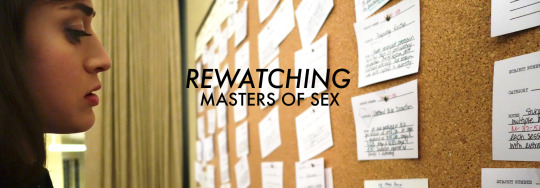
Season 2 Episodes 5-8
It was around this time in Masters of Sex’s second season back in 2014 when I thought to myself 'when are Allison Janney and Beau Bridges going to come back?'. They were heavily involved in the advertising for this season, even being invited to the photo shoot. I personally wonder if the writers thought that they were going to have a larger role in the season than they did or if they knew all along that they were just going to appear in one episode.
With the exception of the marvelous “Fight”, Masters of Sex has been off to a bit of an underwhelming start with it’s second season. Well, all that is remedied with some of the best episodes of the entire series, starting with “Giants”, arguably the most underrated Masters episode.
"Giants" features an extremely captivating chess game between Bill and Virginia in the first half of the episode, which culminates in the scene at the Park Chancery where--oh you know the scene.
One of my favorite aspects of season two was the focus on racism, and they were able to intertwine Libby into the storyline quite well, seeing where she goes from the start of the season to the end of the season. The racial undertones are quite evident in "Giants" and "Blackbird" as Masters and Johnson go to work at Buell Greens, which is a storyline far more enjoyable than Masters' brief stint at Memorial Hospital. The debate to include African-Americans in the study was a pretty captivating one.
While Michael Sheen has been given plenty of Emmy-worthy material so far in the series (whether it be "Catherine" or "Fight" or "Manhigh"), Lizzy Caplan hasn't really been given nearly as much. I'm not saying that that is in any way her fault; she's amazing as Virginia Johnson, but I don't think she was given as much material to shine so far in the series as Michael Sheen was. I think it's just how the characters were written, with Bill Masters being so closed off that it seems so poignant whenever he shows his true emotions. And for what it's worth, I think Lizzy Caplan's more Emmy-worthy performances are in seasons three and four, which is ironic because I'd consider Michael Sheen's to be in seasons one and two.
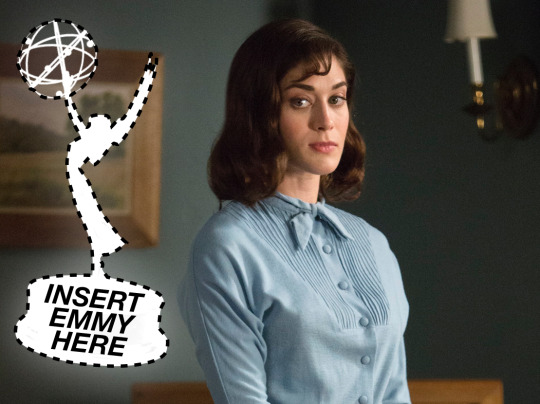
But what I'm trying to say is that all that changes with "Blackbird", in which Lizzy Caplan delivers a truly breathtaking performance, arguably her finest in the entire series.
This second season is so thematically deep that I discover something new each time I watch it. I actually never really understood that subplot of Masters being interviewed by those African American journalists until rewatching that episode this time, and hats off to the writers for such a rich subplot. Seeing Bill confront the editor in that room was probably the first time we see Dickhead Bill Masters emerge.
That's right, ladies and gentlemen, Dickhead Bill Masters is the nickname I'm giving Bill for these middle season two episodes, wherein Bill Masters behaves so appalling that he earns the title of dickhead. And also, considering what we learn later on this season... I like the irony. And Dickhead Bill Masters is center-stage in "Asterion".
"Asterion" is my favorite Masters of Sex episode, and to be honest, it's not even close. That A+ I gave to "Fight" was more out of respect to the ingenious writing, it's not my all-time favorite episode. "Asterion" is an artistic, thorough, elaborate, and often uncomfortable episode, acting as a standalone that manages to fuse Season 2A to Season 2B.
Which leads to my shock that "Asterion" is one of the lower rated episodes of the series on IMDB. That being said, IMDB also has "Party of Four" rated higher than "Matters of Gravity", so it's probably not the best indicator of quality.
But yes, Dickhead Bill Masters is in full force in "Asterion", making Virginia feel bad about herself and basically calling her a bad mother, in perhaps the most evil thing I’ve ever heard the character say. Goddamn, Bill. Why don’t you just suffocate the kid while you’re at it?
“Asterion” features several great Bill/Libby scenes. The scene at night in their bedroom where Libby reveals she wants another child, and, more especially, the scene where they fight whether or not to take his mother’s money. After the scene at the end of “Blackbird” where Libby and Bill kind of share a moment, “Asterion” is the point where the Masters marriage is fractured beyond repair.

My favorite scene of the episode might just be the ending at Johnny’s birthday party. The seeds being laid for the treating-sexual-dysfunction storyline, Libby and Virginia foreshadowing next seasons lakehouse trip, and the powerful ending between Bill and his mother.
"Mirror, Mirror" really feels like the second episode of a season, making minor developments on new storylines introduced in the season premiere (or in this case, "Asterion"). "Mirror, Mirror" is notable for being the first episode where Masters and Johnson begin attempting to treat sexual dysfunction. This surprised me last time I rewatched the show. I thought that they were working to cure sexual dysfunction from the very beginning. I didn't realize it was something introduced in the second season, and it's very smart how they intertwined Bill's own dysfunction with them beginning this line of work.
One thing that always irritated me about criticism towards Masters of Sex season two onward is the argument that “the show needs to go back to focusing on the study”. Even when the second half of Masters of Sex was airing, with all this powerful character-building and Masters & Johnson taking on sexual dysfunction, I would read comments from critics and viewers saying “yeah, but when are we getting back to the study?”
This argument has always infuriated me. Masters of Sex has always had excellent characters and told a captivating tale with Bill and Virginia, yet these people just believe that the show needs to be more like a wikipedia article on orgasms? Not only that, but “the study” was pretty much done with the first season. How much more could they exhaust that storyline? Moving on to sexual dysfunction was the natural step forward. And yet I’d still hear people complaining about them not working on “the study”, which is also such a vague term that it also infuriates me for that reason. It’s always seemed to be just a cloaked way to say that the show was never as good as it was since season one.
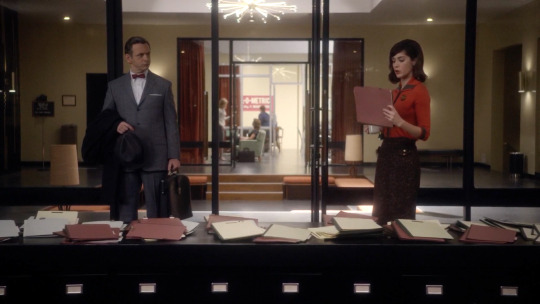
I’d also like to say that it took me until the end of season three (the first time I watched it) to realize that there was a difference in the Masters & Johnson Clinic set. I have to say, I greatly prefer the office they used in the second season. Maybe it’s just the wall color--I like the yellow more than the blueish-grey of seasons three and four.
And perhaps it’s just the fact that I recently got one of those cinnamon brooms and started getting into the fall spirit, but this second half of season two has a real fall aesthetic towards it. I think it’s the color palette: the yellow walls of the Park Chancery and the clinic, and maybe the fact that in terms of the timeline, these episodes take place in October 1960.
Next installment, we close out season two, which includes two Amy Lippman episodes! I must have died and gone to heaven.
Giants: A
Blackbird: A
Asterion: A+
Mirror, Mirror: A-
#Masters of Sex#Rewatching Masters of Sex#Giants#Blackbird#Asterion#Mirror Mirror#Lizzy Caplan#Michael Sheen#Season 2
6 notes
·
View notes
Text
The Great Game + Five-Act Structure
me and @messedupsockindex did a TGG rewatch (i think we’re gonna do the whole show hell yeah hell yeah) and I did some liveblogging that turned into several metas on things i think are important in this episode, with the five-act structure being a Theme (though i went off on a real tangent RE: solar systems/framing and metaphors too). Read on if you dare.
First of all I learned that this was the first episode of the show that was filmed? I find that very interesting, I don’t know much about how to shoot a tv series, BUT if this was the first one that was ready to shoot, i wonder if that means it was the first one finished, and if it was the first one finished, is it because it’s The One that lays out the five-act structure of the whole show?
link to @fellshish ‘s most brilliant meta here
another small spot of evidence for this “TGG is the layout for the whole show” theory is that lots of little shots in this episode are also in the title sequence (could be a coincidence if they did indeed film this episode first, but also maybe not)
Throughout this episode, we are shown an ongoing conversation between Sherlock and John concerning Sherlock’s lack of basic knowledge about our solar system. It effectively frames the episode - one of the opening scenes being their “domestic” (fight), and the penultimate scene (before the pool scene) being the infamous “I won’t be in for tea” / “I’ll get milk and beans” tragedy. I want to liken this episode-long conversation to a technique I saw in a different show.
In this show (Masters of Sex starring the brilliant Michael Sheen and the formidable Lizzy Caplan), a man and a woman are having an affair with each other, but justifying it by saying they are simply “working” and that they’re not emotionally attached to each other (they’re sex researchers, so they “collect data” whenever they meet...it’s dumb.) Anyway, there’s a beautiful episode entitled “Fight” during which they are watching a boxing match in their hotel room while engaging in elaborate sexual roleplay with each other. While the boxing match plays in the background, they riff on what their lives would be like together if they really were the husband and wife duo that they pretend to be for the hotel staff. It’s intricate, and loaded, because you never know when they are acting within the roleplay, or talking honestly to each other about their feelings and pasts. They metaphorically duck and weave like boxers around their feelings and around each other. Their conversation often talks literally about boxing, too - The Fight is a tool through which the writers explore the characters’ bond for the viewer.
I see Moftiss using this same technique when I hear Sherlock and John going back and forth THROUGHOUT THE EPISODE about knowledge of the solar system. The first time they discuss it, you can feel John trying to understand why Sherlock comprehends things the way he does - why can something as basic as the solar system (or attraction) be allowed to slip through the cracks of his otherwise daunting intellect? And you can also feel Sherlock’s frustration with the way John perceives him - why should it MATTER if he doesn’t know the exact details of how the solar system (attraction) works - shouldn’t the fact that he knows it exists be enough, and if or when when he needs to, he can figure it out from there? They continue to explore the concept with each other as the episode goes on.

Here, John has accepted that Sherlock doesn’t (or thinks he doesn’t) care about the mechanics of something as basic as the solar system (attraction). So he asks, why comment on it? Sherlock says even if he doesn’t understand it, he still appreciates it. Telling.
In the final instance of this conversation, the penultimate scene of the episode, John tells Sherlock that maybe a little knowledge of the solar system might have come in handy after all. But Sherlock also has a point:
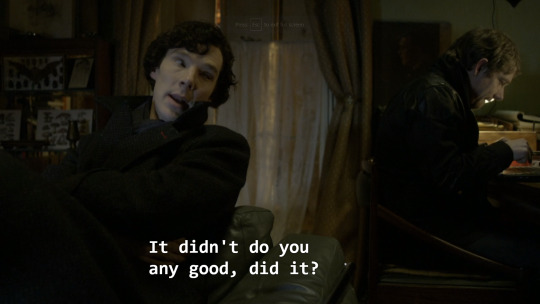
John’s knowledge of something so basic as attraction has been useless to him thus far.
If we’re gonna accept food = sex, I found it funny that John was “starving” and he found a head in the fridge. John, there’s head for dinner, if you want it! Even funnier that Sherlock’s response to “I’m starving” was that he was researching saliva. (I don’t love the food=sex thing, I just don’t think it’s intentional, but I do feel like it’s a valid interpretation here that Sherlock is subtextually begging John to let him suck it)
I’m too tired to figure out what Mycroft’s dental appointment could possibly mean but both of us were like??? My half-baked theory right now (borrowing from M theory) is that the “dental appointment” was actually Mycroft getting the shit kicked out of him by Moriarty/Mary/whoever the mastermind is, so that Mycroft would plant the missile plan crime for Sherlock?
okay so I never really realized this but Sherlock knows Jim is gay bc he uses hair product and then season 4 John has hella hair product....huh
Sherlock’s security outfit is queer coded but suddenly I can’t find any evidence of this I just...have it somewhere in my psyche that a police/security costume outfit like that was claimed by queer people and I can’t remember why?
For hostage number 3, the old woman, Moriarty (or whoever is on the other end of the computer) calls her “a funny one.” @messedupsockindex told me while we were watching about the midpoint of the five-act structure being the breakthrough, the point of no return, the point at which key knowledge is gained (from John Yorke’s Into The Woods, also brilliantly discussed here). I can’t help but think of this seemingly offhand line as a tiny clue to the importance of series 3 of BBC Sherlock. (In case you didn’t know, the midpoint of the whole show, if there are indeed going to be fifteen episodes, is...you guessed it...the best man speech).
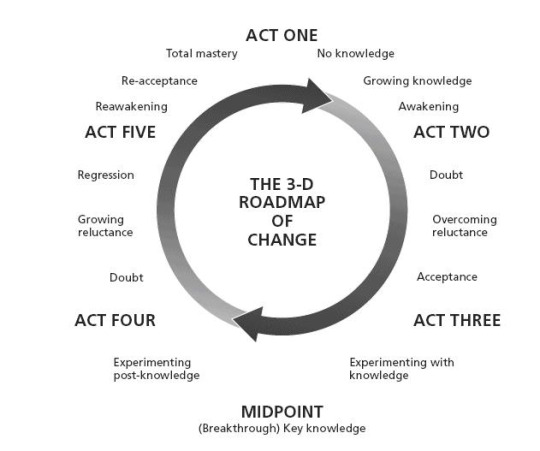
The last Greenwich pip case that is solved, a case in which we have a hostage on the other end of a phone, is the fake painting. The solution to this case is “the Van Buren supernova” aka part of outer space, seen from our solar system. As I’ve argued above, the solar system is a metaphor/framing device used in this episode to subtextually discuss the engine of this entire show - Sherlock and John’s relationship. How very telling that Sherlock, even Sherlock, very nearly doesn’t get to this solution. But, when he does...

(me reading about the five act structure and realizing series four is fake)
Moriarty’s last few lines - I find this whole scene to be absolutely vital to understanding the point of the whole show, but especially the last bit.

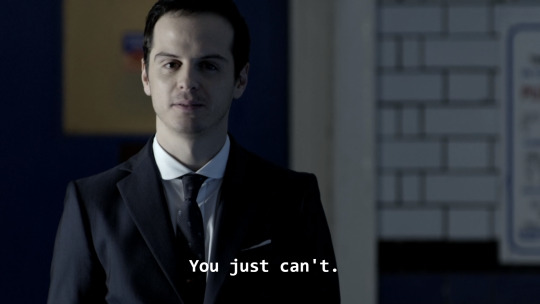
There is probably already someone who has explained/noticed this but...the exchange that Moriarty is responding to, that happened before he re-entered the room, was Sherlock and John getting the closest they ever get in the WHOLE show to discussing the sexual tension/attraction between them (I think I’m again standing on the shoulders of the legendary M theory here). John has taken a huge leap in choosing to bring up what “people” might think about Sherlock ripping his clothes off in a darkened swimming pool. Sherlock responds jokingly but not dismissively, and the logical next step would be to discuss what they themselves think about it...until of course they are interrupted by this, by literally being held at gunpoint.
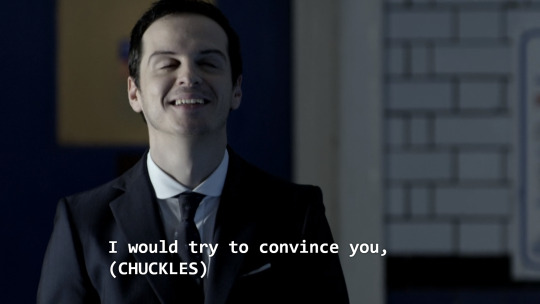
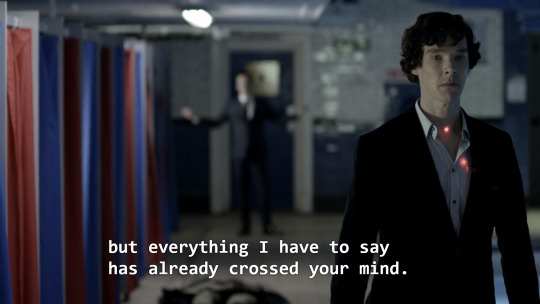
Moriarty’s lines here are apparently some pretty famous lines in ACD canon. I didn’t know the canon context, so it’s a little easier to just parse the lines in context of this scene. Moriarty wants to stop this discussion that Sherlock and John are about to have, and more broadly, whatever that conversation might lead to. He would try to convince them that they can’t be allowed to continue, but everything he has to say, all the convincing he could possibly do, has already crossed Sherlock’s mind (or both of their minds - it’s actually not specified who he’s talking to here). This is true because Sherlock and/or John are afraid to “continue” - discuss their feelings for each other - because of trauma and internalized homophobia. All the reasons that they shouldn’t “continue,” reasons that Moriarty could cite out loud, have already crossed their minds, probably more than once. I think this unspoken meaning makes so much more sense than taking Moriarty’s “you can’t be allowed to continue” to mean “you can’t be allowed to continue to solve crimes,” which is what it meant in ACD canon. And it’s a fantastic rework of an ACD canon line.
So... the end, I guess. I probably should have split this up into different posts...
120 notes
·
View notes